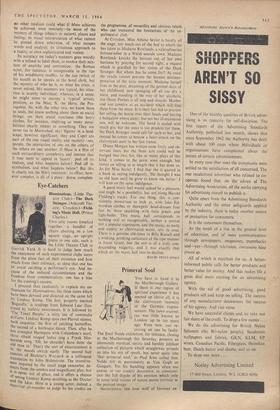Eye-Catchers
Illuminations. (Little The- atre Club.)—The Dark Stranger. (Ashcroft The- atre, Croydon.)—Field- ing's Music Hall. (Prince Charles.) Two attic rooms knocked together, a handful of chairs abutting on a low square stage, an upright piano to one side; such is the Little Theatre Club in Garrick Yard. It is hard to judge how much the enjoyment of such experimental clubs sterns from the plain fact of their existence and how much from their intimacy, so close that one has to avoid catching a performer's eye. And be- cause of the reduced circumstances and the freedom from commercialism, one has a bias for the evening's success.
I proceed thus cautiously to explain my en- thusiasm for Illuminations, the three items which have been devised and directed on the same bill by Lindsay Kemp. The first, properly marked 'Bagatelle,' is readings from Edward Lear illus- trated by balletic movements. It is followed by `The Tinsel People,' a witty use of commedia dell'arte. Lindsay Kemp does two Pierrot mimes. both exquisite; the first of catching butterflies, the second of a burlesque dance. Then, after he has strangled Harlequin with Columbine's scarf, three ribald rouged ladies sing a Frank Nbr- manish song, 'Oh, he shouldn't have done the ?Id man in.' That's the sort of entertainment it
15; the moods switch easily. The second half consists of Btichner's Woyzeck in a colloquial
translation by John Holmstrom. The inventive- ness required by the small stage somewhat de- tracts from the sombre and magnificent play, but it is never out of place, and it offers a chance of seeing Lindsay Kemp doubling as the Doctor and the Idiot. Here is a young' actor, indeed a theatrical all-rounder to judge by his credits on
the programme, of versatility and obvious talent, who can transcend the limitations of the ex- perimental club.
At Croydon, Miss Athene Seyler is hardly off the stage, nor much out of the bed to which she has taken as Madame Rowlands, a valetudinarian fortune-teller in a Welsh seaside town. Madame Rowlands knocks the bottom out of her own business by praying for second sight, a request which is gratified by her vision of the Dark Stranger. But whom has he come for? As usual the oracle cannot prevent the human misinter- pretation of the vatic moment. Madame herself lives in the past, dreaming of the genteel days of her childhood, now sponging off all too dry a niece, and standing in the way of her alcoholic sop (Scott Forbes is all slop and slouch). Mother and son connive at an accident which will free them from the niece. It is their last bid to prevent her selling the house over their heads and buying a bungalow where aunty, but not her ill-mannered son, will be welcome. The bond is sealed with much gin; but the niece is too prudent for them. No Dark Stranger could call for such as her, and instead he comes to bestow a heart-attack on the clairvoyant aunt in her last trance.
Diana Morgan has written some lively and ob- servant lines, but the three acts could well be merged into two, for, like so many plays of this kind, it comes to the point soon enough, but insists on telling us at length that it has done so. As for Miss Seyler, I find that she is quoted in a book as saying indulgently, 'He thought I was an old ham until he grew to know me better.' I will lean on the same indulgence.
A good music hall would indeed be a pleasure, and might be a possibility, but not along Harold Fielding's tracks. For one thing, this is con- sistently monstrous to look at, with fake Ed- wardian clothes or showgirls' head-dresses four • feet by three sparkling with false jewels and light-bulbs. This music hall corresponds to nothing real or recognisable, neither a revival nor a popular expression, and the music, as nasty and aseptic as chlorinated water, sets its tone. There is a genuine old-timer in Billy Russell and a winking, prinking caricature of the ripe manner in Joyce Grant, but the rest is of a truly con- descending vulgarity, and it was exactly that which set the music hall into its decline.
DAVID PRYCE-JONES


































 Previous page
Previous page